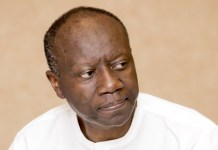Deputy Finance Minister, Charles Adu-Boahen has taken a rather curious position to defend the controversial Agyapa/Asaase Scandal citing tax-efficiency as the main reason for incorporating the company claimed to be owned by the state in the dodgy tax haven in the British virgin island, Jersey.
During a press conference organized at the behest of the Finance ministry and hosted by his colleague Minister of Information, the hitherto shrewd Adu-Boahen said the move to incorporate Agyapa Royalties Limited in Jersey is tax-efficient and will see the shareholders getting the best out of the transaction.
The new agreement will enable the country to use the Special Purpose Vehicle (SPV), Agyapa Royalties Limited, to secure about $1 billion to finance large infrastructural projects and in return gift a 49 per cent of the nation’s equity in gold royalties to a yet to be known owners.
According to the Attorney General in a memo to Ken Ofori Atta, dated July 22, “The Agreements appear to be an arrangement for the sale of shares and the
sharing of dividends. Pursuant to section 27(c) and (d) of the Minerals Income
and Investment Fund AcT 2018 (Act 978), Asaase Royalties Limited (“ListCo”)
was established in the Bailiwick of Jersey by the Minerals Income Investment
Fund (Fund) for the purpose of listing shares on the London and Ghana Stock
Exchange markets. Subsequently, ListCo incorporated ARG Royalties Ghana
Limited (RoyaltyCo) in Ghana. Thus, the Fund is currently the sole owner of
ListCo and RoyaltyCo. Upon a successful listing, ListCo will have new
shareholders and the Fund to assume an administrative role for the purpose
of transferring dividends in the form of the income received by the Republic of
A.
Ghana from mineral royalties in addition to rendering monthly and quarterly
reports on collections made through RoyaltyCo”
This means that the prospective shareholders of Agyapa to whom the 49% is reserved for would, in addition, be exempted from paying taxes in Ghana although the Ghanaian laws make it compulsory for any person (company) whose income is derived from or whose income accrued in Ghana to be liable to tax in Ghana.
The incorporation of the company in Jersey, which is a tax haven has come under criticism with some describing it as shady adding that it sets the tone for the deal to be shredded by corruption.
The assertion of the Deputy Minister appears to be endorsing tax avoidance schemes while the nation is in critical need to expand it’s tax base to rake in revenue.
Executive Director for the Africa Centre for Energy Policy, Benjamin Boakye is one of those who believe the destination of incorporation sends a bad signal.
“So you have a country that is deciding to go and hide and do business. Beyond it being possible and legal for you to register and do business in a tax haven, there are more questions to be asked when a country decides to go and hide in a tax haven,” he said on Top Story August 25.
Reacting to these concerns at a press briefing Thursday, Charles Adu Boahen explained that the decision to establish the company in Jersey will inure to the benefit to Ghana through the maximisation of value for investors.
Describing the opinions as unfortunate, the Deputy Minister explained that “anybody who thinks that we are using something naughty, he himself knows why he thinks that.”
“We used it because it was a tax-efficient avenue to use. If we had decided to use transfer the royalties to Agyapa that was domiciled in Ghana, We would have ended up in a situation where we would be paying tax twice.”
He further explained that; “The royalty flows itself is in a tax. It would have come to Agyapa as a company incorporated in Ghana as a revenue stream. It will then come out as an income, profit after tax.
“So that profit will be taxed before you get your net income which will then come out.”
“By routing it through Jersey, the 100% comes in and goes out as the same hundred less whatever operating expenses there, there are no taxes. Which means that the shareholders are getting the full benefits of that 100% of royalties.”
The Attorney General has described the agreement as skewed against the interest of the Republic of Ghana.













